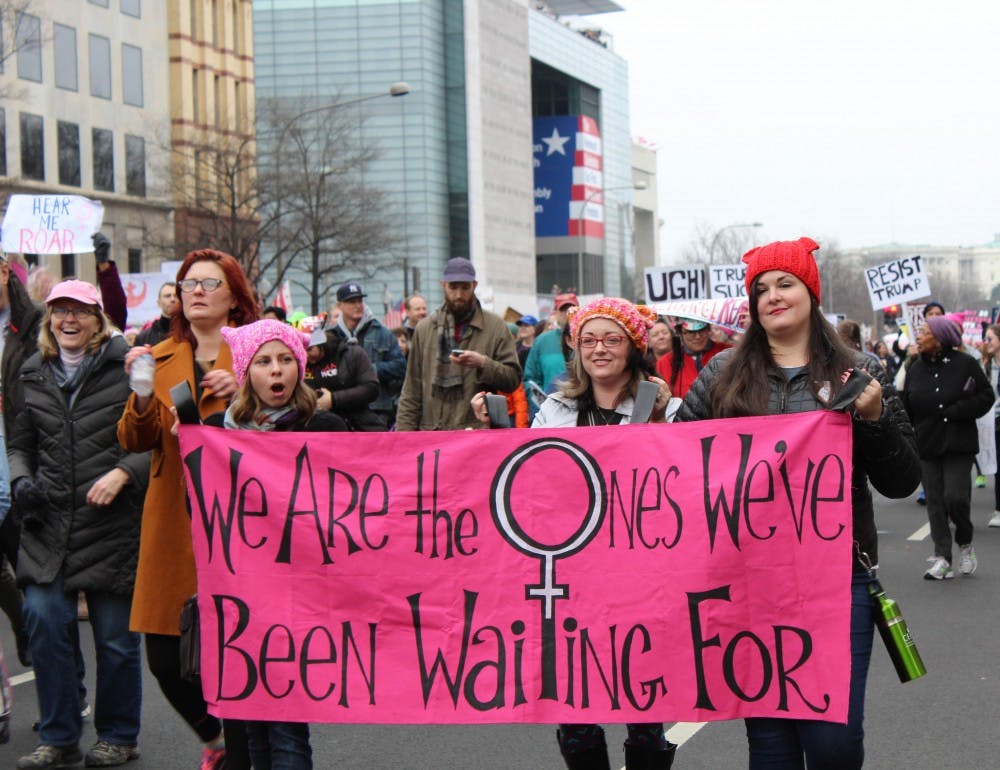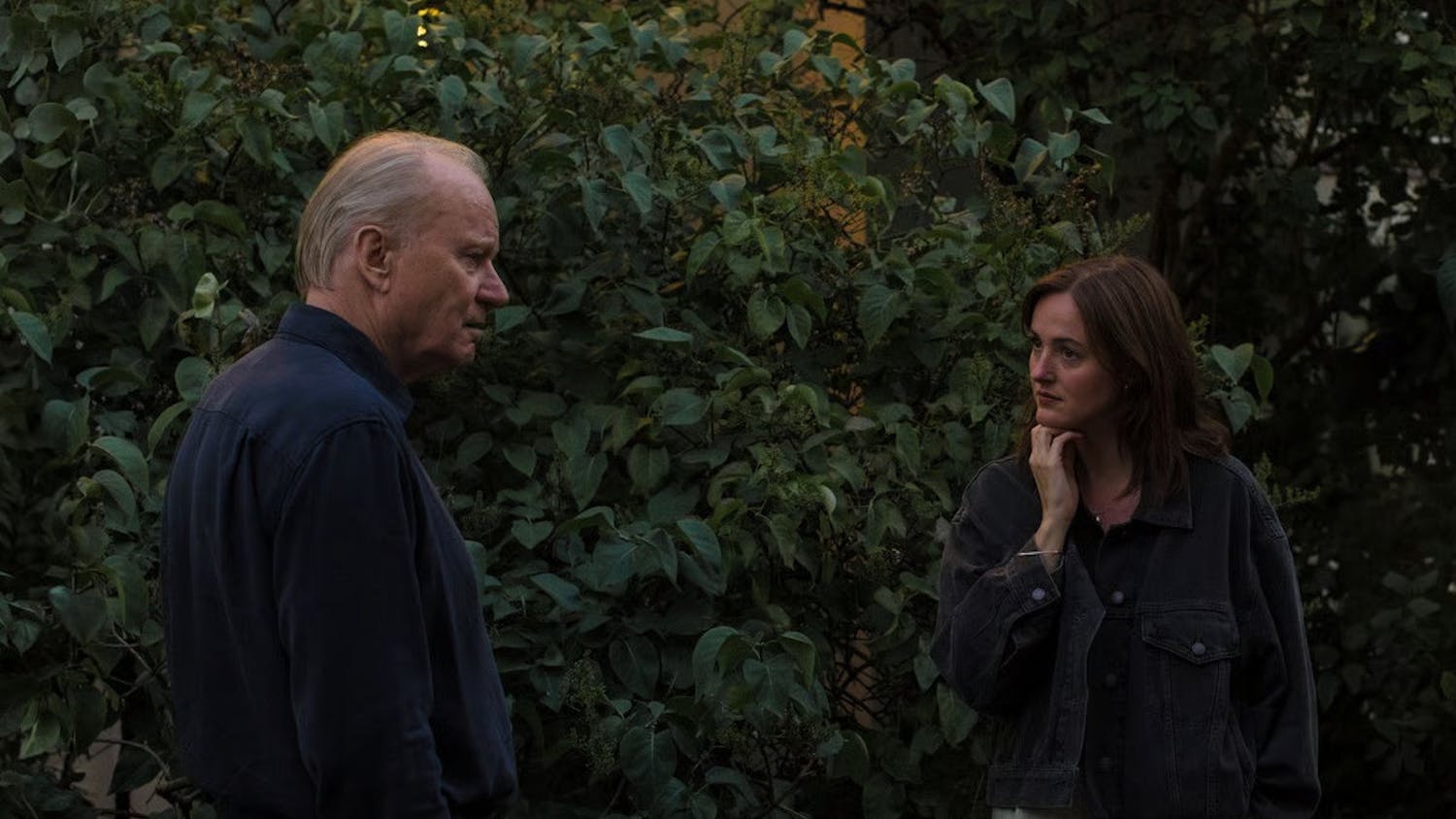A petition created by members of AU’s Panhellenic Council seeking to change the dates of sorority recruitment so it will not conflict with the 2019 Women’s March on Jan. 19 has received over 1,900 signatures since it was posted late last week.
Sorority members say that AU’s Fraternity and Sorority Life (FSL) office is not budging when it comes to changing the date to allow women involved in sorority life to march without missing recruitment events.
“[Panhellenic is] about supporting sisterhood, and we believe in ideals many organizations hold true to themselves, and the Women's March does the same thing,” said Molly Engels, a Phi Mu general member. “This is plain contradictory.”
The Panhellenic Council, which currently represents eight sororities on campus, and representatives from each sorority chapter held a meeting with members of the FSL office on Dec. 5 to discuss recruitment and the possibility of a schedule change. The meeting resulted in the creation of a petition that formalized the sororities’ concerns.
“We all came to the meeting with proposed solutions and ideas, and we made a point to be very flexible,” said Mackenzie Territo, the vice president of recruitment for Alpha Chi Omega and the author of the petition. “Still, we felt we were not being heard by the administration and advisors that were there. They kept telling us that we needed to be more formal, and we said, ‘OK, if you want formal, we’ll give you formal!’”
Nadir McCoy, who serves as the coordinator of FSL, started at AU this fall and has been the main point person for sorority recruitment planning. The position in charge of McCoy, the assistant director of FSL, was left unfilled since Colin Gerker stepped down in February. The position was recently taken over by Travis Roberts.
McCoy said he could not comment on whether he wanted to change the recruitment date when reached by phone on Dec. 7.
“But I do absolutely understand the importance of the march,” McCoy said. “We just want to support the women in our sororities as much as possible.”
Caitlyn Duff, assistant recruitment director for Alpha Xi Delta, said that Gerker originally set the recruitment dates a year ago. The Women’s March date was also set roughly one year ago.
Students wishing to be part of recruitment and pledge a sorority must be available for all events taking place between Jan. 18 and Jan. 22 in order to be considered, according to the spring recruitment enrollment disclaimer published by AU Panhellenic. Current sorority members could face fines or other disciplinary action from their chapters if they miss a recruitment event, depending on the sorority’s rules.
“How can you have a value-based recruitment when you get infracted going to something with the exact same values?” said Sofia Passick, a Panhellenic delegate from Alpha Chi Omega.
The attendance rule is enforced by all Panhellenic sororities, which includes Alpha Chi Omega, Alpha Epsilon Phi, Alpha Xi Delta, Delta Gamma, Phi Mu, Phi Sigma Sigma, Sigma Delta Tau and Sigma Kappa. Chi Omega will not recruit in the spring after being placed on social and recruitment probation in October 2017.
The AU Panhellenic Council realized that recruitment conflicted with the Women’s March two months ago when George Washington University changed its recruitment date to allow members and recruits the ability to attend the march. Several sorority members said they have been in touch with FSL since then to try to work around the march.
Ayana Wilson, the director of Student Activities, said that the number one issue with moving recruitment is available space, and that many of the options that Panhellenic representatives shared “are not feasible.” She said that any changes made to the recruitment dates will be made by working with Panhellenic representatives and the FSL team as part of a “continued conversation.”
“I think students should use their voices to raise concerns they have,” Wilson said by email. “I also think it’s important for all the facts to be shared so when people lend their voice to something they are fully aware of what they’re fighting for.”
On Nov. 16, McCoy sent an email to all Panhellenic chapter presidents telling them that the University’s “complex scheduling process” makes them unable to make changes or adjustments to the recruitment schedule. He said his office will plan ahead to “craft the best plan possible” for recruitment in spring 2020.
“With limited availability in time and space and the multi-month long process of reserving these spaces it is nearly impossible to move the dates,” McCoy wrote in the email obtained by The Eagle. “We explored the ‘ending later’ option but the timing would run the chapters and those managing the system well into the night.”
Shannon Walsh, the president of the AU Panhellenic Council, said that McCoy’s email to the chapter presidents was meant to be the final decision on the matter, but “more pushback has made it controversial still.
Passick said that there were delegates from every organization at the Panhellenic meeting on Dec. 5. Territo said the meeting’s attendance was double its usual numbers, having 50 members there as opposed to the 20-25 usual attendees.
Members from each organization came to the meeting with ideas such as beginning recruitment at 6 a.m. the day before the Women’s March, finishing recruitment at 2 a.m. or scheduling recruitment to be a different weekend overall, Passick said.
“The only thing we could say was ‘please,’” Engels said.
After feeling unheard by administrators, Territo wrote the petition with other members of the Panhellenic Council on Wednesday night. In total, she said that over 30 members of sororities joined the Google document with her to vocalize their concerns collectively.
“Current members are uncomfortable recruiting when this opportunity has been stripped and little has been done to address the concern,” the petition reads. “We feel as a group that the University is inhibiting our ability to develop sisters’ character by limiting our rights to both attend recruitment and the March.”
Reactions to the petition
Panhellenic leaders plan to reach out to the FSL office with the numbers from the petition in another effort to change the date, according to Territo.
“We do understand Nadir [McCoy] is in a tough situation, we even emailed him to thank him for coming to the Wednesday meeting and listening, and we aren’t trying to make enemies, but we will be vocal about what we want for sure,” Passick said.
The conflicting date has already had an effect on recruitment efforts this year, according to sorority leaders. Duff said that there are usually 200 students who have expressed interest in rushing her sorority, Alpha Xi Delta, by this time in the process, but because of the conflicting schedule, only about 130 women have said they are interested.
Other students said they are considering missing part of recruitment to attend the march.
Gracie Burke, a general member and alumni liaison for Phi Mu, said that she wrote to the Phi Mu executive committee two months ago asking to be excused from recruitment to attend the march.
“I knew they wouldn’t [accept the absence], and they didn’t,” Burke said. “Now I’m going back and forth between missing recruitment for the march or not.”
The petition also received criticism from students like Chyanna Antonio, a former member of both Phi Sigma Sigma and business fraternity Alpha Kappa Psi who saw the petition as “a Band-Aid on a bigger issue.”
Antonio published a Facebook post last week that was shared 26 times as of Thursday. In it, she expressed her frustration over there never being petitions or protests surrounding recruitment falling on Martin Luther King Jr. Day, as it does almost every year. She also asked where the “same energy” and activism was for transgender, nonbinary and disabled people who sought to go through Panhellenic recruitment.
“There was a dialogue about the advancement of womanhood, and every person in Panhellenic was for it but not for other things that are also about the advancement of womanhood,” Antonio said in an interview. “Women of color, queer women, trans and nonbinary people aren't advocated for by these women who claim womanhood is higher than all else.”
Territo said that she understood Antonio’s frustration, but added that the Panhellenic community voted unanimously to be trans-inclusive last year.
“Panhellenic also strives to make recruitment disability-inclusive,” Territo said, pointing to a section of the spring recruitment enrollment document that allows students to request accommodations.
Antonio said that many women of color in sororities reached out to her to thank her for writing her post.
“They told me they felt like they were always shut down within their organizations,” Antonio said. “When you’re the only person of color or queer person in the room, it’s hard to speak up. You wind up ostracizing yourself.”





